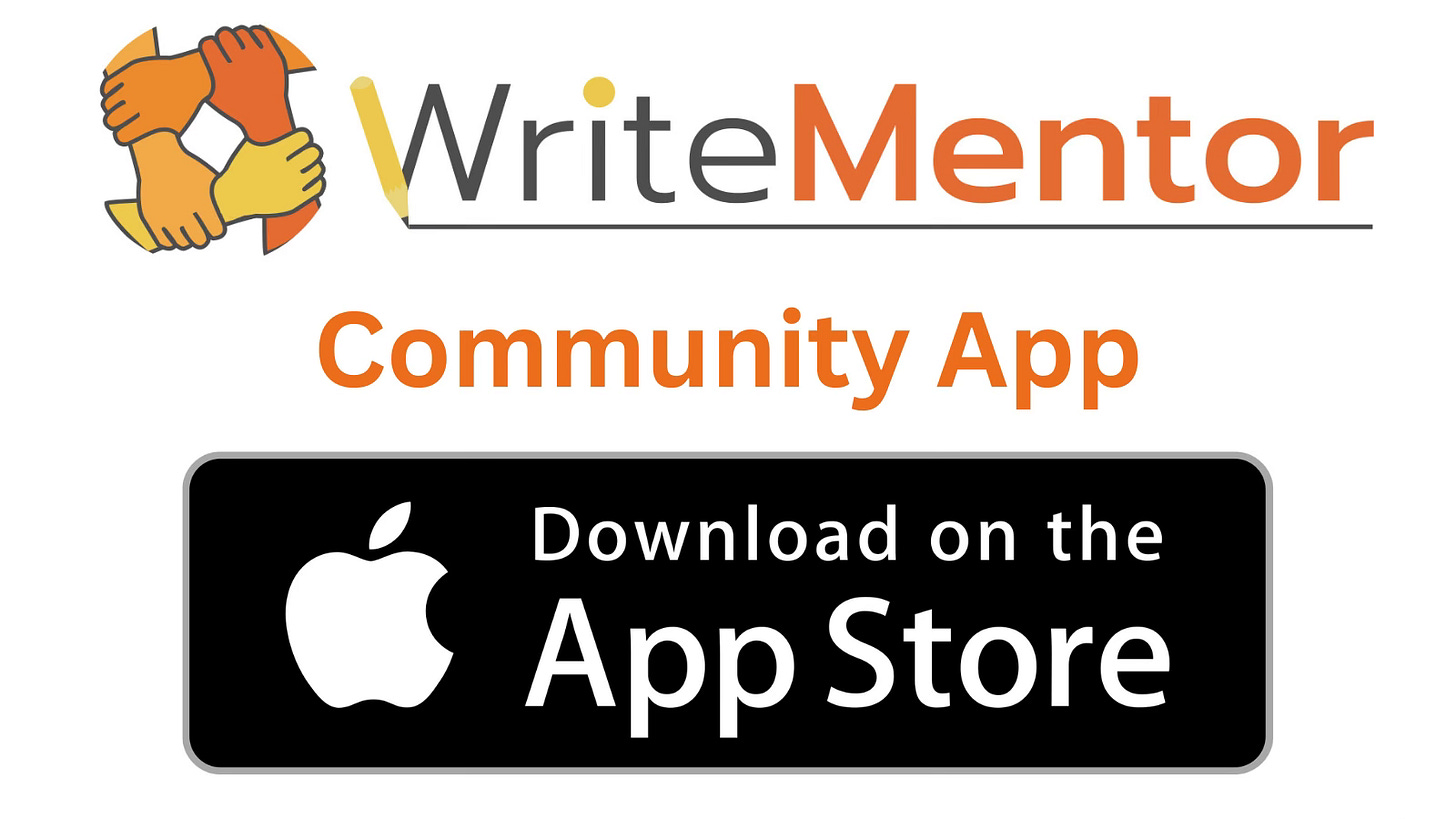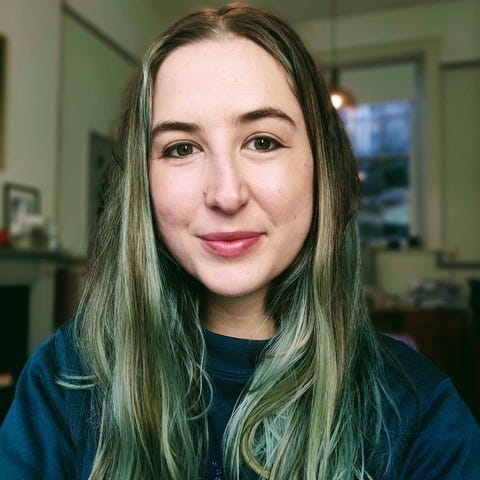What I wish I knew…part 3
News, events, resources and opportunities
Faber Launches 2025 FAB Prize - deadline Friday 25th July.
Undiscovered Voices - deadline 8th September. OPEN NOW!
Hub Calendar (all times GMT/BST)
July
Hub catch up Monday 7th 8pm with Melissa
YA Chat Tuesday 8th 7pm with Melinda Salisbury
MG Chat Thursday 10th 7.30pm with Vashti Hardy
PB Chat Thursday 17th 7pm with Clare Helen Welsh
Writer’s Toolkit: Monday 21st 11am Melissa Welliver, How to Show-Don’t-Tell in Fictional Worlds
A full calendar is here: https://write-mentor.com/events/
All sessions are recorded and available to watch back, so don’t fret about being there ‘live’. This is just a few of the many sessions/opportunities that happen every month in the Hub and are all available on catch-up if you join now.
We’re also delighted to announce another way to connect with us and the whole community:
The Final Word
By Stuart White
What I wish I knew…part 3
Again, I just wanted to say thank you so much for all the replies last week - it’s so heartening to hear from you all to say that what I’m writing is meaningful or interesting.
I had a think about what makes this kind of thing more connecting and relatable than the other stuff I write, and I think the word most of you used was ‘honest’.
And it’s interesting because it’s quite rare for people to write completely honestly, when talking about writing experience, because there’s a fear of saying the wrong thing or offending the wrong person etc - after all, publishing is a small circle of professionals who act as gatekeepers and you really don’t want to alienate them.
Understandable.
But I’ve always felt a few things, and I may be flawed in my thinking, and those are that publishing people generally understand the difficulties of writers and they face many of the same issues we do, but different in context and scale, and that’s the R word - rejection!
I am sure many publishing professionals would also love to be more honest and write or talk about things more freely, but they also have to maintain relationships and not upset people with a ‘too honest’ comment or discussion or written piece.
Fortunately for us writers, there are a few people in the industry who feel comfortable being vulnerable and sharing insights, and that’s such a lifeline for us writers as the industry has felt opaque and closed to us, especially with regards the ins and out and processes, for so long.
I’ll take this opportunity just now to share a couple of other substacks where industry people are being transparent and sharing great insights - go give them a follow:
So back to where we left off last week - after discussing the art of saying no - we move onto sending my work out where I know my (and my stories’ worth).
I sent my 5th (completed) book out to agents in early March 2021, and I decided I wanted to publicly record the experience, not just for my own reference, but for others to see the highs and lows of querying - to make them feel less alone and unique in the anticipation, hope and rejection of the process.
You can read the full, extended thread here.
As you probably gathered from my previous newsletter, I was at a stage in my writing where I was at peace with not being published and was willing to say no to any offer that wasn’t for me.
Of course, I hoped that agents would love it, that they’d want to represent me with enthusiasm and get the best possible deals for my work - but if they didn’t, I was okay with it.
And somehow that attitude transformed querying for me - it became the professional exchange that it should be - sure, I still had hopes and dreams etc, I’m not sure they ever go away - but I was realistic and the circle of agents I sent this book to was very small.
By this stage I had been running WM for 3 years and I had my own experience to draw on, too, and I knew who I wanted to represent me - I wasn’t just going to send my work to any old agent. They had to be right, both in terms of personality, style and also in terms of what they represented, and what they had sold previously.
I should say here that some brand new agents at established agencies can also be a good shout because they have the support and contacts from senior associates but a smaller list and more time, but just be conscious of the disadvantages of a new agent - I’ve seen a lot come and go in the last decade - it’s a tough job and if you’re not making sales or the workload etc overwhelms, there can be a higher turnover of newer agents than for more experienced ones. Just worth considering pros and cons with agents, but also do so on an individual basis - there’s no (or there shouldn’t ever be) blanket advice on this.
By this point of querying, I had established good relationships with most of the agents I was querying, because for most of them I’d sent them the previous 4 books (or at least 2 or 3 of them) and they had maybe requested a previous one and suggested I follow up with new works.
So I obliged and did so, making sure to mention the previous interactions - I think this fairly sped up the process for me, too, as this round of querying, requests, rejections all came much faster than before.
Ultimately this one ended up a close call for many agents, but they didn’t go for it.
But I had already begun work on the next one, and I was excited about this one - it was my Middle-Grade Dr Who inspired time-travel book. I adore Dr Who and so it was so much fun - the perfect tonic to rejection and a reminder to myself that writing is supposed to be joyous and fulfilling, and not soul-sapping labour that it can sometimes feel like, especially when we think too much about outcomes and querying etc.
And book 6 was written like no time had passed at all (although in reality it was a year or so. And I repeated the querying process like I had the year before, and to my surprise I got an offer for that book.
I have to be honest, it was exciting. It felt good to have someone who’ll believed in me and I had a call with the agent and it was the week before London Book Fair, so she wanted me to quickly send over pitches and author profile for her to have on hand and use to pitch my book to publishers at the fair.
She was so lovely and discussed other things, like pitching me for IP work and commended me for the work I’d done in the community and raising my online profile etc etc.
With the LBF coming up, it really shortened my thinking time - most people ask for 2 weeks to decide on signing with an agent - but I had less than 2 days if I recall properly.
It felt rushed, and understandably so, but the one thing that over a decade of querying had taught me was not to rush into a decision.
So I said no, firstly to the LBF thing (which was HARD to do!), and then to signing with the agent as well. As I say, the agent themselves was lovely but it just didn’t feel 100% right for me.
At this point, I began exploring self-publishing more seriously - I know many of you have also considered this. I spent about 6-12 months reading about it, finding out as much as I could from those who had done it and had some measure of success and began to plot my own plan.
I won’t go into this topic so much here, as I already do on my own substack, but it felt right to me in a way that any other route has not felt right for me. It’s not for everyone, but it is for anyone, as long as you know what you’re getting into and what it involves.
I’m going to leave it there for this week as my writing has been a hybrid since this point, writing some things for self-publishing and others for traditional and other times not writing anything at all - I’m sure you can all relate.
But I guess the key takeaway this week is to capitalise and build on those relationships with agents from previous submissions - I think, with querying, no submission is wasted as each one has the potential to develop a small ‘in’ or ‘micro-relationship’.
And remember when agents say something nice, or tell you to query them next time, they truly do mean it.
Don’t minimise those emails because they do carry weight when you next query, and you should always mention them - I’ve always had replies along the lines of ‘oh, yes I remember that last submission, can’t wait to get stuck into this one’ or similar.
I’m also interested in how many you think you’d have the strength of will to say no having your book pitched by an agent to publishers at LBF because it didn’t feel 100% right? What kind of things would make you turn away something you’d dreamed about for a decade? It might be worth considering now before your time comes and you aren’t able to delineate the romance and excitement of the moment from the reality of asking a huge career decision on the spot! Do you think I have a screw loose or am I right to stick firmly to what I see as my vision for my books and my work?
*ps - just wanted to finish this one by saying that I know with great honesty comes great vulnerability and I know that sharing all of this will havre altered how many of you perceive me, or value what I have to say, and I’m okay with that. The only way we can make meaningful connections with others is through vulnerability from being honest and open, and it’s the same for our characters in our books - show them raw and open and honest and you’ll get much greater connection from your readers.
Have a great week everyone!
Writing can be lonely, but it doesn’t need to be
May the Force be with you!
Stuart, Florianne and Melissa







